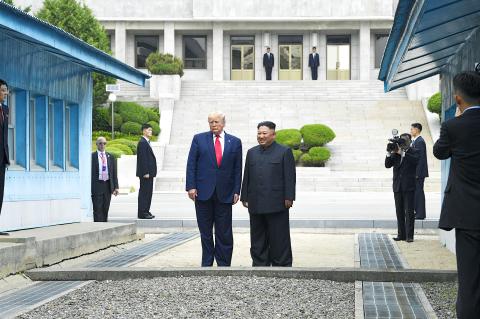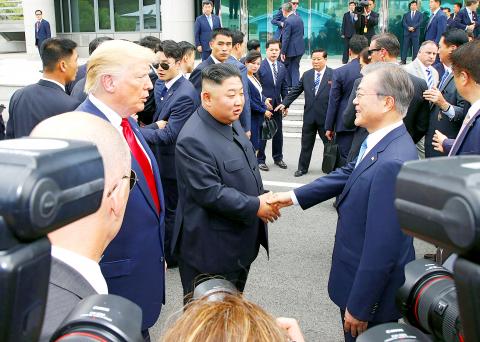US President Donald Trump yesterday took a historic step into North Korea, drawing on his penchant for showmanship and surprise to pull off talks with North Korean leader Kim Jong-un in the Demilitarized Zone (DMZ) that divides the two Koreas.
The drama was magnified by the choice of the Panmunjom truce village as the venue for his meeting with Kim, where 66 years ago Americans and North Koreans huddled to draw up the Military Demarcation Line following the bitter 1950-1953 Korean War.
“Stepping across that line has been a great honor,” Trump said as he sat down with Kim, amid a chaotic scene of US and North Korean reporters jostling to capture the historic moment while secret service agents from both nations struggled to contain them.

Photo: AP
Earlier in the day, Trump held a meeting and lunched with South Korean President Moon Jae-in at the ornate presidential Blue House in Seoul. Then, the two confirmed the meeting with Kim was indeed going to happen.
“President Trump gave big hope to the world through his tweet yesterday,” Moon said. “Seeing that tweet, I felt like flowers of hope were blossoming on the Korean Peninsula.”
Trump tweeted the invitation only on Saturday to Kim to join him as he toured the DMZ, a meeting he had said would probably last only for a couple of minutes for a symbolic handshake across the line.

Photo: EPA-EFE
The spur-of-the-moment idea apparently caught Kim by surprise, but he was quick to reciprocate.
Trump stepped briefly across the concrete barrier that divides the Korean Peninsula before bringing Kim into Freedom House on the southern side for an hour-long meeting.
They agreed to direct officials to set up teams who will tackle the challenge of overcoming fundamental differences in positions that led to the collapse of their second summit in February in Hanoi, Vietnam.
Trump kept saying he was not sure whether the meeting would come together, giving reporters traveling with him regular updates while noting that logistics and security were difficult.
After Trump arrived at the DMZ, he got his first look at North Korea from the vantage point of Observation Post Ouellette as flags of the US, South Korea and the UN flapped in the brisk wind.
Then, he walked slowly from the Freedom House on the South Korean side of the border village to meet the North Korean leader who approached the concrete block that serves as the military demarcation line from the other side.
“I never expected to meet you at this place,” Kim said.
The leaders shook hands and Kim laughed out loud.
“Would you like me to come across the line?” Trump said he asked Kim as they conversed across the line. “He said: ‘I would be honored.’”
The chaotic scene of reporters and security agents bumping into each other highlighted how little planning had gone into the hastily arranged encounter.
However, the two leaders were oblivious to the confusion as they exchanged invitations to visit each others’ capitals.
“I would invite him right now, to the White House,” Trump said.
Kim told Trump he would be welcomed in Pyongyang.
Critics have questioned whether Trump has made any substantive gains from his friendships and worry that his eagerness to talk to autocrats results in legitimizing them.
Even as Trump savored the meeting, he could not hide his resentment for the media and the foreign policy establishment who he believes have not given him enough credit for working toward curbing Pyongyang’s nuclear ambitions.
Trump hit back at the critics saying that tensions had eased for everyday Koreans and Japanese and that it was “insulting” to suggest progress has not been made.

CHIP WAR: The new restrictions are expected to cut off China’s access to Taiwan’s technologies, materials and equipment essential to building AI semiconductors Taiwan has blacklisted Huawei Technologies Co (華為) and Semiconductor Manufacturing International Corp (SMIC, 中芯), dealing another major blow to the two companies spearheading China’s efforts to develop cutting-edge artificial intelligence (AI) chip technologies. The Ministry of Economic Affairs’ International Trade Administration has included Huawei, SMIC and several of their subsidiaries in an update of its so-called strategic high-tech commodities entity list, the latest version on its Web site showed on Saturday. It did not publicly announce the change. Other entities on the list include organizations such as the Taliban and al-Qaeda, as well as companies in China, Iran and elsewhere. Local companies need

CRITICISM: It is generally accepted that the Straits Forum is a CCP ‘united front’ platform, and anyone attending should maintain Taiwan’s dignity, the council said The Mainland Affairs Council (MAC) yesterday said it deeply regrets that former president Ma Ying-jeou (馬英九) echoed the Chinese Communist Party’s (CCP) “one China” principle and “united front” tactics by telling the Straits Forum that Taiwanese yearn for both sides of the Taiwan Strait to move toward “peace” and “integration.” The 17th annual Straits Forum yesterday opened in Xiamen, China, and while the Chinese Nationalist Party’s (KMT) local government heads were absent for the first time in 17 years, Ma attended the forum as “former KMT chairperson” and met with Chinese People’s Political Consultative Conference Chairman Wang Huning (王滬寧). Wang

CROSS-STRAIT: The MAC said it barred the Chinese officials from attending an event, because they failed to provide guarantees that Taiwan would be treated with respect The Mainland Affairs Council (MAC) on Friday night defended its decision to bar Chinese officials and tourism representatives from attending a tourism event in Taipei next month, citing the unsafe conditions for Taiwanese in China. The Taipei International Summer Travel Expo, organized by the Taiwan Tourism Exchange Association, is to run from July 18 to 21. China’s Taiwan Affairs Office spokeswoman Zhu Fenglian (朱鳳蓮) on Friday said that representatives from China’s travel industry were excluded from the expo. The Democratic Progressive Party government is obstructing cross-strait tourism exchange in a vain attempt to ignore the mainstream support for peaceful development

ELITE UNIT: President William Lai yesterday praised the National Police Agency’s Special Operations Group after watching it go through assault training and hostage rescue drills The US Navy regularly conducts global war games to develop deterrence strategies against a potential Chinese invasion of Taiwan, aimed at making the nation “a very difficult target to take,” US Acting Chief of Naval Operations James Kilby said on Wednesday. Testifying before the US House of Representatives Armed Services Committee, Kilby said the navy has studied the issue extensively, including routine simulations at the Naval War College. The navy is focused on five key areas: long-range strike capabilities; countering China’s command, control, communications, computers, cyber, intelligence, surveillance, reconnaissance and targeting; terminal ship defense; contested logistics; and nontraditional maritime denial tactics, Kilby